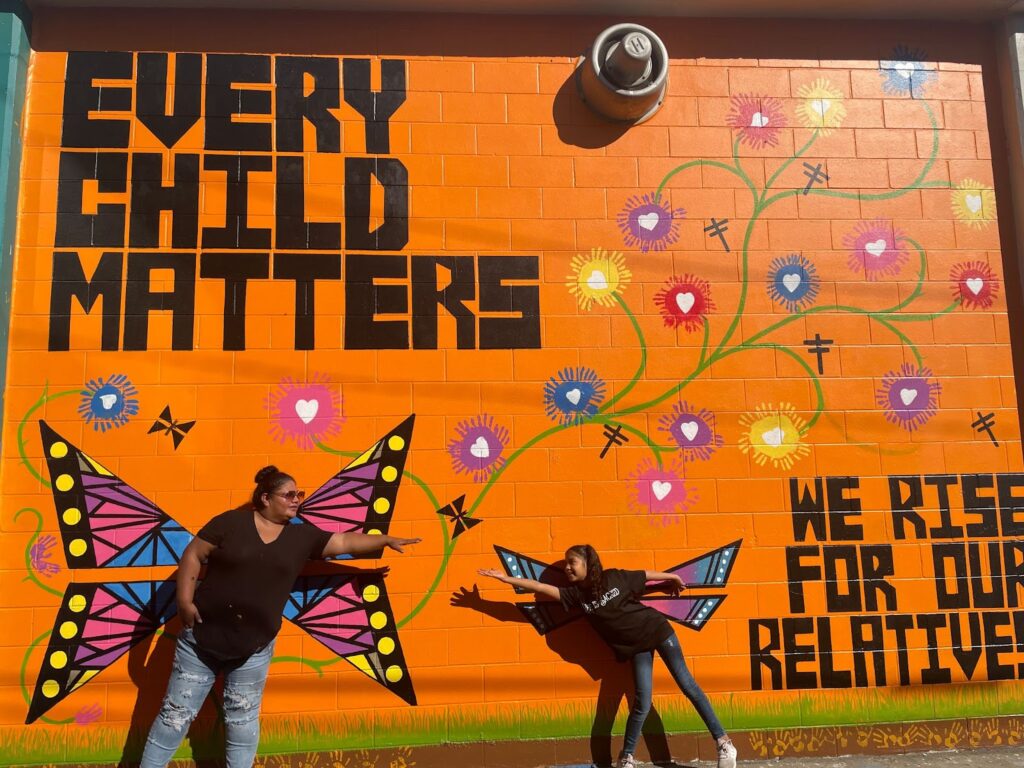
Community members across North Dakota joined in a memorial walk on Sept. 30, 2023, to honor survivors of Indian boarding schools and remember the children who never made it home. (Photo credit/ Adrianna Adame)
Against the backdrop of the Missouri River, a community will gather at Keelboat Park to honor the resilience of Indian boarding school survivors. As poetry is spoken and painted rocks are placed in a land art installation, the fourth annual Orange Shirt Day North Dakota reminds participants of the deep wounds of the past—and the strength found in coming together to heal. This year, the event kicks off on Sunday and continues Monday.
The Indian boarding schools sought to “kill the Indian, save the man” through forced cultural assimilation, in the words of Carlisle School founder Richard Henry Pratt. His philosophy was employed by more than 500 U.S. boarding schools and then adopted by Canada, which opened more than 130 Indian boarding schools.
These institutions took Indigenous children away from their families and stripped them of their identities once they arrived. The schools cut children’s hair, banned them from speaking their Native language and forced them to become “Americanized.” Children often died from illness, malnutrition or other unknown causes at these schools. Others endured physical and sexual abuse, as well as neglect.

Orange Shirt Day North Dakota is a grassroots organization that hosts annual events to honor survivors and families affected by Indian boarding schools. Last year, they organized “Walking For Our Relatives,” a walk from Custer Park to Art Alley in downtown Bismarck, and a “Bones of Crows” screening at United Tribes Technical College.
This year, they have two more events scheduled for Orange Shirt Day. The first is a night of remembrance. A candlelight vigil will be held from 7 to 8 p.m. on Sunday. The location will be announced a few days before the event. The organizers invited a few boarding school survivors willing to share pieces of their stories. Attendees will gather in a talking circle to share their thoughts.
“We’ll all come together to listen and pray to remember the little ones that have yet to come home,” said Melanie Moniz, one of the organizers.
The next evening, Orange Shirt Day North Dakota will host the main event at Keelboat Park at 6 p.m. on Monday. Boarding school survivors, archivists and historians working to recover the archives from the Bismarck Indian School will be in attendance. Younger voices will share Every Child Matters and Orange Shirt Day-themed poetry.
Participants will then walk along the river to unveil a land art installation that the group will create. Community members are invited to bring rocks they’ve painted orange to add to the artwork. Agnes Yellow Bear, another community organizer for Orange Shirt Day in North Dakota, mentioned that this year’s installation will be similar to last year’s mural. The primary goal is to create a public space that acknowledges the experiences of those affected by Indian boarding schools.
“I’m hoping that people will realize how important it is to continue to hold these spaces and have these conversations,” she said.
“I believe that when we acknowledge those past harms, it allows us the opportunity to tend to those wounds and allow healing to happen.”
AgnesYellow Bear, Orange Shirt Day: North Dakota organizer
Yellow Bear, a member of the Kawacatoose First Nation in Saskatchewan, Canada, understands the generational trauma inflicted by Indian boarding schools, also referred to as residential schools, in Canada. Her father attended one of these schools and remained silent about his experiences for many years. At times, she said, the trauma caused by these institutions affected the way her father raised her and made it difficult for him to be a healthy parent.
“I don’t blame him for that,” said Yellow Bear. “I’ve been able to discuss how those institutions have impacted our generation, as some of those cycles continue today.”
As a community organizer, Yellow Bear raises awareness about residential schools and amplifies the voices of survivors and their families. “Awareness isn’t just for our non-Native relatives, but it’s also for all of us — to realize those things, and to acknowledge that there is still a lot of healing that needs to happen within our communities,” she said.
Events organized by Orange Shirt Day North Dakota offer a space for healing. Honoring survivors and raising public awareness about Indian boarding schools is a crucial first step toward that goal.
“I believe that when we acknowledge those past harms, it allows us the opportunity to tend to those wounds and allow healing to happen,” Yellow Bear said.
© Buffalo's Fire. All rights reserved. Content may not be reproduced without written permission from the Indigenous Media Freedom Alliance. See our content sharing guidelines for media partner usage.







